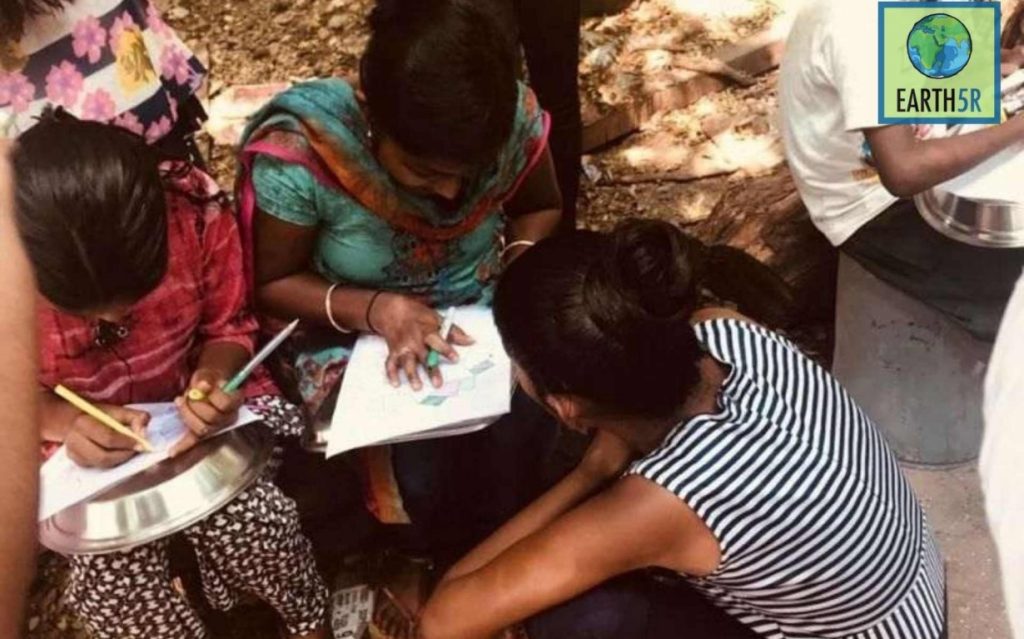15 Actions That Will Change Your Life: Home Equals Planet

The HOME EQUALS PLANET initiative by Earth5R finds sustainable solutions to environmental problems using 15 tangible actions that an individual can perform on a personal level. These actions have an added benefit: they not only help preserve natural resources and protect the environment, but they’re also excellent steps to take in order to lead a healthy, content lifestyle!
According to The World Counts, 2.12 billion tons of waste from across the world ends up in landfills annually
It is estimated that by 2025, the world’s cities will produce over three times more waste than in 2009.
Origami bookmark made by upcycling waste paper during the Home Equals Planet Training. 17% of the total waste generated globally is paper and cardboard.
The Sustainable Development Goals (SDGs) are 17 interlinked goals that the Members of the United Nations aim to achieve by 2030 for creating a sustainable world. The wide range of goals integrate solutions to several issues that we, as a contemporary society, face today.
The HOME EQUALS PLANET initiative is closely linked to the Sustainable Development Goals as the actions strive for a sustainable future.
The simple action of segregating one’s household waste can cause a massive impact and reduce the amount of landfill waste by almost 60%.
Spreading awareness about these simple yet effective actions causes the participating individuals to bring change into their lifestyle.
Our Citizen Volunteers have not only inculcated these actions in their lives but they also educate the people through interactive training sessions.
Here we have two participants from our training sessions who would like to share their experience with us.
Aakriti Lakhanpal is currently in the final year of high school. She understands the gravity of the environmental crisis and joined our training session to realise ways to help save the environment.
Aakriti Lakhanpal: “Attending the HOME EQUALS PLANET training session made me realise the difference I can make just by making sustainable choices in my personal life. Since attending the session, I have made several changes to my lifestyle and am trying to improve it using the 15 actions.
Aakriti has taken up gardening as a means to spend more time in nature as well as to grow her own herbs
I now exercise on a daily basis, which wasn’t a part of my daily routine earlier. I avoid buying items in plastic packaging whenever possible. I am also learning new recipes to try out at home so that I can reduce the amount of food I eat from outside.
Aakriti has stopped using single-use plastic packaging and bags while shopping for groceries and instead uses cloth bags which are more sustainable.
It is actually quite surprising the positive impact it has made on my daily routine in just a few weeks time.
I feel less tired, more enthusiastic about my work and I feel more aware of the role I play in my community.”
After joining the Home Equals Planet movement, Aakriti began learning new recipes and reduced eating from outside.
Aakriti has put into words what several other trainees have felt after being part of the HOME EQUALS PLANET training. It is vital to understand that long-lasting and meaningful change begins at home, at the level of an individual.
Online training conducted by citizen volunteer, Siya Wadhwa, on the 15 Actions with the Home Equal Planet program
Sujata Wadhwa strongly believes in giving back to our community. She regularly volunteers for social projects and would like to contribute to protecting the planet and work for an environmental cause.
Sujata Wadhwa: “The HOME EQUALS PLANET initiative is definitely a unique program as it tries to bring about change by involving every citizen and member of our communities. After receiving the training for this program, I have been trying to inculcate as many of the 15 actions into my day to day routine as I can.
A small composting unit set-up at Sujata’s home while carrying out the 15 Actions under the Home Equals Planet Program
When going to the market for groceries, I try to look for alternative methods of packing and buy the least amount of plastic-packaged items as possible.
Sujata often volunteers to teach Art and Crafts to the kids from underprivileged communities. The Home Equals Planet program encourages volunteering for improved social well being and for giving back to the society
I have started to go to the park every day for a walk for at least an hour so that I can both exercise and spend time in nature as well.
I also make it a point to carry a reusable cloth bag with me so that I can avoid using the plastic bags from the counter. I now feel more energetic and environmentally conscious.”
Citizen Volunteer, Siya Wadhwa, training Sujata on the 15 Actions with the Home Equals Planet Program
Individuals like these are global citizens and this is exactly the kind of enthusiasm and awareness that Earth5R instils in millions of people all around the world.
Unsegregated waste (left) could not be efficiently disposed of or recovered. Segregated waste (right) allows for easy recovery for recycling.
Adopt these 15 actions to join a movement that is growing and gaining more people everyday so that you can lead a healthier and happier lifestyle. To learn more about HOME EQUALS PLANET as well as Earth5R and our work, explore our website: https://earth5r.org/.
ABOUT EARTH5R
Earth5R is an environmental organization from India with its head office at Mumbai. It works with the NGO sector, Companies and helps them conduct environmental Corporate Social Responsibility (CSR) programs across India.
Earth5R specializes in circular economy based projects. Earth5R also offers short term and long term environmental courses and fellowships.
– Community training and reporting by Siya Wadhwa, editing by Aishani Raghav




